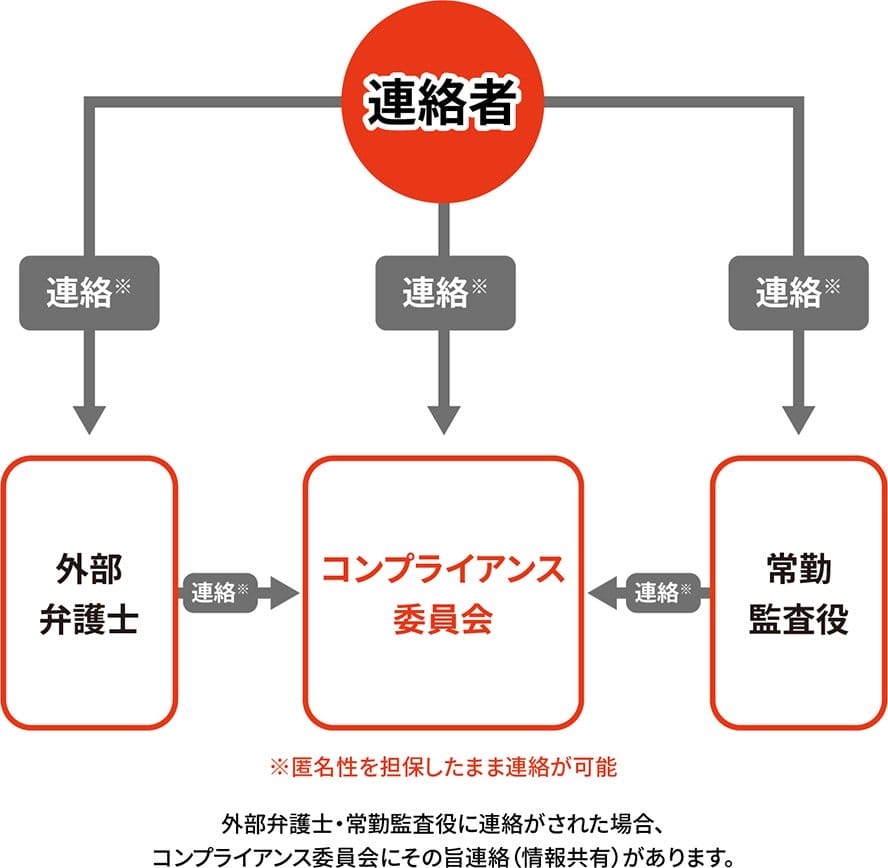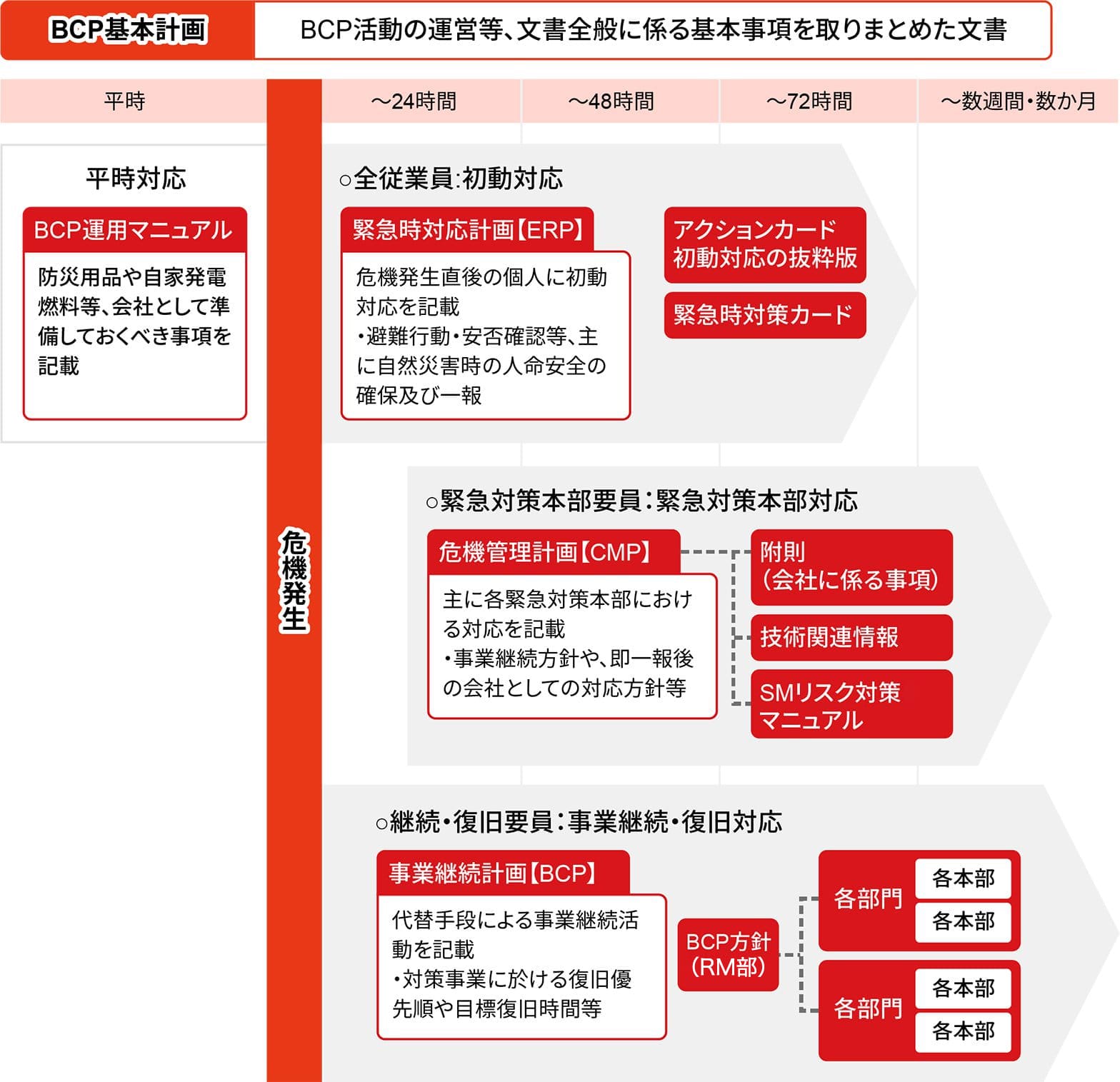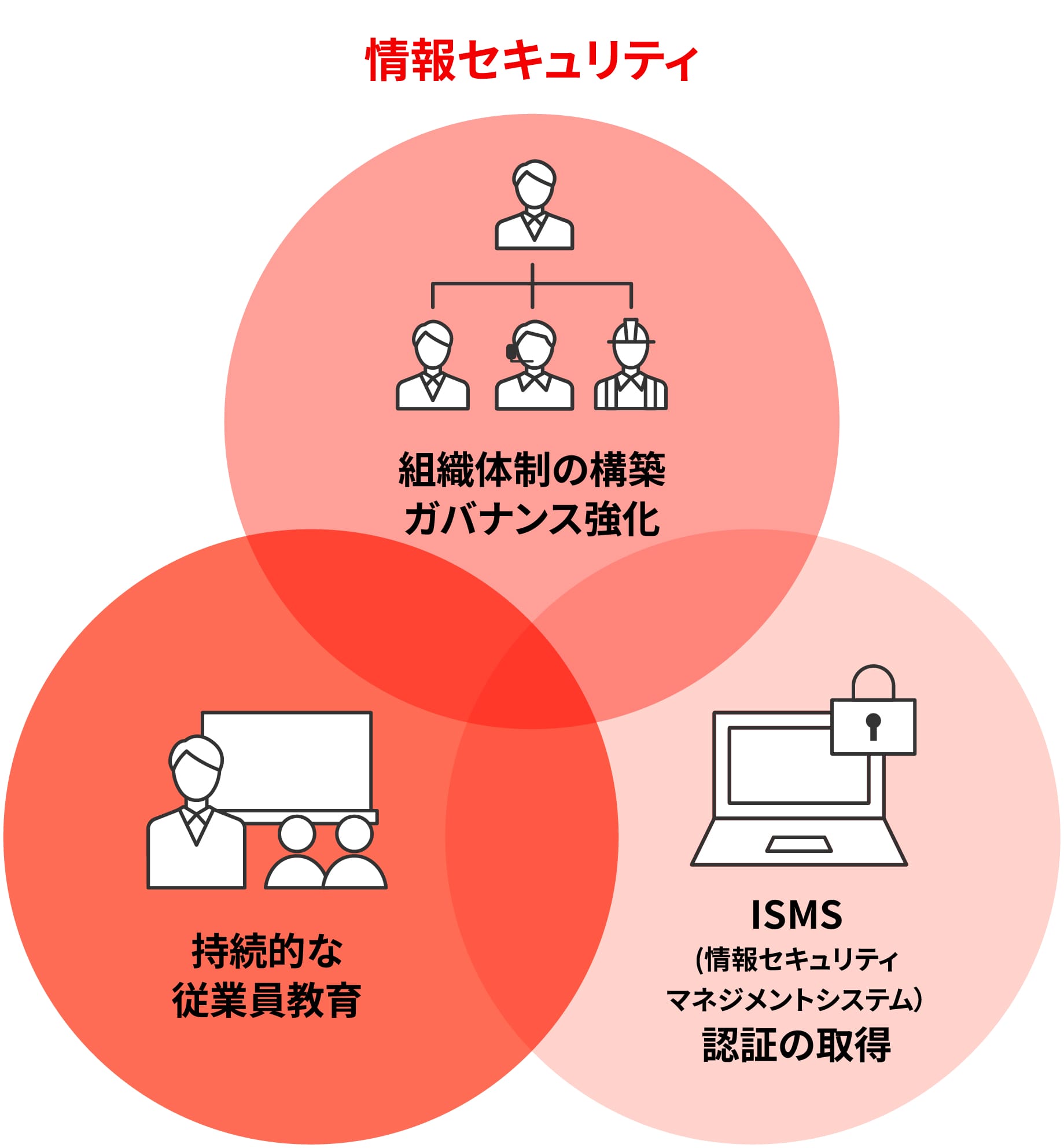Corporate governance
Compliance
Based on the recognition that “compliance is essential for sound corporate business activities,” we have established a system to ensure thorough compliance with laws and social norms, etc. We are striving to improve compliance awareness among employees.
Compliance system
In order to strengthen and promote the company-wide compliance system, we have established the Compliance Committee, which is chaired by the head of the corporate department and reports directly to the president.
The Compliance Committee prepares and distributes a "Compliance Manual," as well as formulates and implements a "Compliance Action Plan" to promote understanding of laws and regulations related to business activities, as well as social norms and ethical awareness.
Speak Up System

In the event that a compliance issue arises and it is difficult to report through the normal organizational channels, we have introduced a system (the Speak Up System) that enables information to be communicated directly to the Compliance Committee, or through an external lawyer or our full-time Audit & Supervisory Board Member.
Under this system, information can be communicated either anonymously or publicly, the confidentiality of the contact person and the content of the communication is strictly maintained, and there is a guarantee that the contact person will not be subjected to any detrimental treatment as a result of communicating information.
In addition, we have set up a contact point for business partners to receive information in order to quickly detect and resolve compliance violations. If it is difficult to resolve the issue through discussion with our staff, please contact us at the contact point below. Anonymous reporting is also possible.
[Business Partner Line (Window)]
Email: [email protected]
- *The contact point has been entrusted to Integrex Co., Ltd.
Compliance efforts
At our company, we incorporate compliance as a theme in various training programs, such as training for management staff and new employees, in order to raise awareness and unify understanding of the issue.
In addition, messages from management are sent to the entire company to share values and raise awareness of compliance, and original compliance content (videos and comics) are produced and distributed on the company intranet (e-learning) to provide a learning system that is suited to the work style of each employee.
Dealing with anti-social forces
For the development of the local community and society, we will thoroughly sever all ties with antisocial forces, and if we are asked to take any disadvantageous action, we will take a resolute stance and not comply with the demands of the other party.
Risk management
Approach to risk management
As the business environment surrounding companies is constantly changing, the risks they face are becoming more diverse and complex.
As a company that provides a wide range of services including broadcasting and communications services, J:COM is aware of potential risks in advance and has established organizational activities and systems to promote risk reduction activities, minimize losses in the event that risks materialize, and continuously improve the quality of its operations.
In addition, in the event of a disaster, we will make every effort to ensure the safety of all employees and their families, and have a system in place to continue or restore service provision as much as possible.
Risk Management System
At J:COM J:COM, the Representative Director and other Director in charge of business execution are responsible for establishing a comprehensive risk management system for all risks associated with corporate activities and for promoting risk management in each department.
Specifically, the Headquarters Management Division supervises company-wide risk management activities, and each department identifies risks related to its respective operations and implements the PDCA cycle for the identified risks to improve the level of risk management. In addition, the Audit Division monitors the cross-sectional risk situation by evaluating the effectiveness of monitoring.
Crisis Management
We have taken the following measures to ensure that we can provide stable services to our customers even in the event of an emergency.
1. Basic policy on business continuity
As a company that provides a wide range of services including broadcasting and communications services, J:COM is keenly aware of its social responsibility in the event of an emergency.
In the event of an emergency, J:COM will respond in accordance with the following basic policies:
- As a company that provides social infrastructure, our basic policy is to balance "ensuring the safety of all employees and their families" with "restoring and continuing services."
- We are keenly aware of our responsibility as a company that provides a lifeline and as a company that operates a media outlet (community channel) that can disseminate disaster information at the municipal level, and we will respond accordingly.
- In our programming supply business, we are aware of our responsibility to distribute programs throughout Japan, and will endeavor to ensure that our provision of services to customers is not significantly restricted, even if the Tokyo area, where our head office is located, is hit by an emergency.
- In the event of a wide-area disaster, support will be provided from bases and group companies in other regions rather than from the affected area, with all of J:COM working together to provide support to the affected areas.
2. BCP Manual
J:COM has prepared the following BCP manual to ensure prompt and appropriate response in the event of an emergency.
Specifically, based on the "BCP Basic Plan," we have formulated a "BCP Operation Manual" to prepare for times of crisis, as well as an "Emergency Response Plan (ERP)," "Crisis Management Plan (CMP)," and "Business Continuity Plan (BCP)" to deal with crises when they occur, and have determined who is eligible for each document and when they should be used.
In the event of an emergency, we will set up emergency response headquarters at our head office and local bases to respond. In addition, based on the lessons learned from major disasters in recent years since the Great East Japan Earthquake, we conduct disaster drills at least once a year to prepare for large-scale disasters.

3. Emergency response system
In the event of an emergency, J:COM J:COM set up emergency response headquarters at its headquarters and each base, and these headquarters across the country will work together to respond in accordance with the following principles.
Emergency Response System Principles
- Act with human life as the top priority
- Create a single chain of command
- Aggregate information
- Emphasis on on-site judgment
Emergency Response Headquarters
4. Initial response in the event of a crisis
J:COM has established initial response procedures for all types of crisis events that have occurred or may occur, and is taking measures to minimize losses in the unlikely event that a crisis does occur by taking appropriate crisis responses.
Anticipated crisis events
Immediate Report
Speed is essential when gathering crisis-related information, so even if the information is incomplete or fragmented, we report the situation immediately to top management, including the Chairman & CEO, and each relevant department (* the "one-to-one" principle), and we work based on the principle of "immediate reporting," which means that the best possible measures will be taken.
- * One-what principle: Report based on information that is known from at least one of the 5W1H (six-what principle)
5. Disaster-resistant networks and facilities
At J:COM, we believe it is our responsibility to strive to improve the stability and reliability of our network so that our customers can comfortably use our diverse services and continue to serve as a public vessel that supports our customers' lives. I am.
Important Facilities
J:COM 's broadcasting and communications bases, which are important facilities, are designed to ensure safety and enable uninterrupted service even in the event of an emergency.
- Earthquake-resistant design that can withstand even major earthquakes
- Provision of spare batteries, emergency generators, and mobile power supply vehicles
- Waterproof boards are installed to prevent water ingress
- East-West redundancy of monitoring network

Cable Network
The network that connects J:COM 's broadcasting and communications bases is designed to be disaster-resistant.
- Networks between bases are redundant with multiple routes
- A mechanism to detect faults and automatically switch to alternative routes
- Provision of emergency batteries in case of power shortage

Providing stable services
In order to provide customers with stable services even in the event of an emergency, J:COM strives to maintain quality 24 hours a day, 365 days a year, from network monitoring to equipment maintenance.
6. Provision of disaster prevention and disaster information
J:COM has signed disaster prevention information agreements and regional support agreements with over 200 local governments, and disseminates information on local safety and security through community channels and other means.
Information security
As a company that provides a wide range of services including broadcasting and communications services, J:COM strictly manages personal information of its customers and its own confidential information.

Information management system
J:COM has established "Basic Regulations for Information Security Management" and has set up an Information Security Committee that reports directly to the President to promote measures to strengthen information security throughout the entire J:COM Group.
Privacy Policy
J:COM will handle customers' personal data appropriately by establishing an internal system and taking safety control measures so that customers can use our services with peace of mind.
We strive to maintain trust by publishing our policies on data utilization and our efforts regarding the acquisition, use, and protection of personal data on our "Privacy Portal" site.
Information Asset Protection Initiatives
J:COM has established the "Basic Policy on Information Security" and is committed to protecting information assets, while also working to obtain ISMS (Information Security Management System) certification for the entire J:COM Group.
To ensure that our customers can use our services with peace of mind, we implement appropriate information security measures for the information assets we hold and protect them from various threats and vulnerabilities.
We also provide information asset protection training to all employees to raise their awareness of the importance of protecting information assets.
invoice system
The invoice system, also known as the "qualified invoice storage method," is a method of input tax deduction for consumption tax, and began on October 1, 2023.
The invoice is called a "qualified invoice" and is a document in which the seller (JCOM) informs the buyer (customer) of the exact applicable tax rate, amount of consumption tax, etc.
In addition, a qualified invoice is a document or data that contains the "name and registration number of the qualified invoice issuer," "applicable tax rate," and "amount of consumption tax, etc."
Qualified invoices can only be issued by qualified invoice issuers registered with the tax office director.
- Company site top
- Company Profile
- Corporate governance









